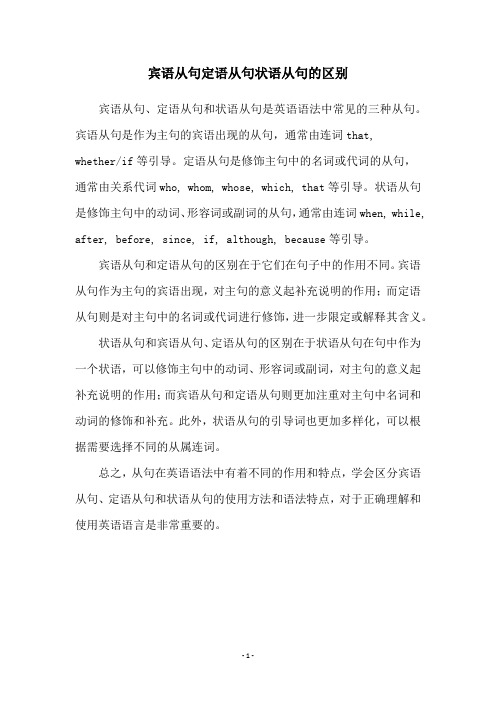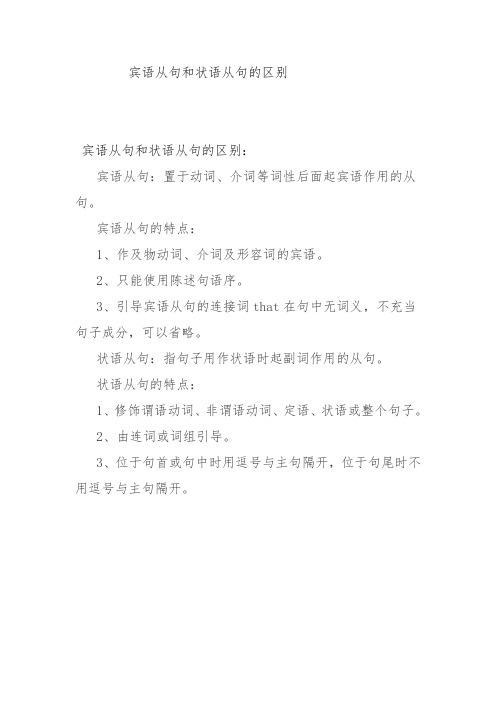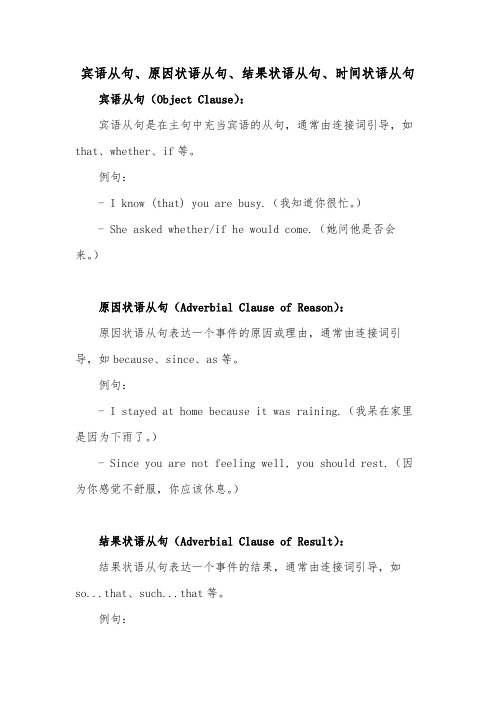宾语从句与状语从句
语法中的宾语从句与目的状语从句

语法中的宾语从句与目的状语从句一、引言语法是语言学的重要组成部分,它帮助我们理解和运用语言的结构和规则。
宾语从句和目的状语从句是语法中两个重要的概念,它们在句子中起着不同的作用。
本文旨在详细介绍宾语从句与目的状语从句的定义、特点、构成和使用方法,以帮助读者更好地理解和运用这两个语法要点。
二、宾语从句宾语从句是句子中充当宾语的从句。
它通常由连词引导,常见的连词有“that”、“whether”、“if”等。
宾语从句可以出现在及物动词、介词、形容词及名词后面。
1. 特点宾语从句的特点是:具有完整的句子结构,包括主语、谓语和宾语。
它一般不能独立存在,必须依附于一个主句。
2. 构成宾语从句的构成有以下几种形式:(1)宾语从句使用陈述句语序,即主语在前,谓语在中,宾语在后。
例如:“I know that he is a good student.”(我知道他是一个好学生。
)(2)宾语从句常用的引导词是“that”,但在口语中常省略掉。
例如:“She said (that) she would come tomorrow.”(她说她明天会来。
)(3)宾语从句还可以使用连词“whether”或“if”。
例如:“I am not sure whether/if it will rain tomorrow.”(我不确定明天是否会下雨。
)3. 使用方法宾语从句在英语句子中的使用方法有以下几个方面:(1)作及物动词的宾语。
例如:“I believe (that) he is telling the truth.”(我相信他在说真话。
)(2)作介词的宾语。
例如:“I am interested in what you said.”(我对你说的内容感兴趣。
)(3)作形容词的宾语。
例如:“I am glad (that) you passed the exam.”(我很高兴你通过了考试。
)(4)作名词的宾语。
例如:“He has no idea what to do next.”(他不知道接下来该做什么。
高三复习-状语从句和宾语从句区别

状语从句和宾语从句区别
宾语从句就是在复合句中作宾语的名词性从句,通常放在主句谓语动词(及物动词)或介词之后。
状语从句是用来修饰谓语动词、其它动词、定语、状语或整个句子的从句叫做状语从句。
在英语里面从句是有引导词引导的(跟在引导词后面),没有引导词的是主句。
首先说宾语从句,简单来说是原本一个句子中做宾语的地方用了一个句子,这个句子叫宾语从句。
动词和介词后面加宾语,所以动词介词后面跟宾语从句。
状语从句,分为时间,地点,目的,结果,原因,条件状语从句,翻译为当什么时候,在哪里,为了怎么怎么样。
I will build my house where there are many trees.此句子就是状语从句我会把房子建在有许多书的地方。
中考英语——宾语从句和状语从句

2010中考英语重点句法考点:宾语从句和状语从句一、直接引语变间接引语1.人称的变化:一随主,二随宾,第三人称不更新。
1). "一随主"指若直接引语中的主语为第一人称时, 变间接引语时应与主句的主语人称一致.She said "I like playing basketball".She said that _____ _____ playing basketball .2). "二随宾"指若直接宾语中的主语为第二人称时, 变间接宾语时应与主句的宾语人称一致.She asked Tom "Can I have a look at your picture".She asked Tom if ______ could have a look at ______ picture .3). "第三人称不更新"指若直接宾语中的主语为第三人称时, 变间接宾语时人称保持不变.She said to me "They want to help me".She told me that _____ _____ to help me .2.指示代词,时间、地点状语的变化直接引语间接引语指示代词this that that those时间状语now thentoday that daythis morning that morning three days ago three days before Last week the week beforetomorrowthe next /following day next year the next year地点状语here there动词come go二. 宾语从句的考查宾语从句在句中作及物动词的宾语,或介词的宾语,或形容词的宾语。
根据引导宾语从句的不同连词,宾语从句可分为三类。
宾语从句定语从句状语从句的区别

宾语从句定语从句状语从句的区别
宾语从句、定语从句和状语从句是英语语法中常见的三种从句。
宾语从句是作为主句的宾语出现的从句,通常由连词that,
whether/if等引导。
定语从句是修饰主句中的名词或代词的从句,
通常由关系代词who, whom, whose, which, that等引导。
状语从句是修饰主句中的动词、形容词或副词的从句,通常由连词when, while, after, before, since, if, although, because等引导。
宾语从句和定语从句的区别在于它们在句子中的作用不同。
宾语从句作为主句的宾语出现,对主句的意义起补充说明的作用;而定语从句则是对主句中的名词或代词进行修饰,进一步限定或解释其含义。
状语从句和宾语从句、定语从句的区别在于状语从句在句中作为一个状语,可以修饰主句中的动词、形容词或副词,对主句的意义起补充说明的作用;而宾语从句和定语从句则更加注重对主句中名词和动词的修饰和补充。
此外,状语从句的引导词也更加多样化,可以根据需要选择不同的从属连词。
总之,从句在英语语法中有着不同的作用和特点,学会区分宾语从句、定语从句和状语从句的使用方法和语法特点,对于正确理解和使用英语语言是非常重要的。
- 1 -。
宾语从句与状语从句

04
宾语从句与状语从句的对比
结构和语序的对比
01
宾语从句的结构
02
状语从句的结构
宾语从句是一个完整的句子作为宾语 ,通常跟在动词、形容词或介词后面 。其语序与陈述句相同,即主语+谓 语+其他成分。
状语从句是一个完整的句子作为状语 ,修饰主句中的动词、形容词或整个 句子。其语序也遵循陈述句的语序。
宾语从句中的状语从句
宾语从句中也可以包含状语从句,用来进一 步说明宾语从句中的动作或状态。例如,“ 我告诉他,当我到达时给他打电话。”中, “当我到达时”是状语从句,修饰“打电话
”。
状语从句在宾语从句中的使用
要点一
状句中的独立状语从句
状语从句可以作为宾语从句的一部分,用来修饰宾语从句中 的动词或形容词。例如,“我知道他昨天来了。”中,“昨 天”是状语从句,修饰“来了”,同时整个句子作为“知道” 的宾语从句。
合并
有时可以将两个句子合并为一个句子,其中一个句子作为 宾语从句,另一个句子作为状语从句。例如,“他很累。 他不想吃饭。”可以合并为“因为他很累,所以他不想吃 饭。”,其中“他很累”是原因状语从句,“他不想吃饭” 是主句,“因为”是连接词。
06
总结与展望
宾语从句与状语从句的重要性和应用
重要性
宾语从句和状语从句是英语语法中的两大重要句型, 它们在句子中充当不同的成分,具有不同的语法功能 ,对于理解和运用英语语言具有重要意义。
构成
通常由从属连词引导一个完整的句子作为状语从句,从句中的主语和谓语保持正常的语 序。
状语从句的语序和时态
语序
状语从句的语序通常遵循正常的语序,即主 语在谓语之前。但在某些情况下,为了强调 或保持句子的平衡,从句中的成分可能会发 生变化。
宾语从句和状语从句的区别

宾语从句和状语从句的区别
宾语从句和状语从句的区别:
宾语从句:置于动词、介词等词性后面起宾语作用的从句。
宾语从句的特点:
1、作及物动词、介词及形容词的宾语。
2、只能使用陈述句语序。
3、引导宾语从句的连接词that在句中无词义,不充当句子成分,可以省略。
状语从句:指句子用作状语时起副词作用的从句。
状语从句的特点:
1、修饰谓语动词、非谓语动词、定语、状语或整个句子。
2、由连词或词组引导。
3、位于句首或句中时用逗号与主句隔开,位于句尾时不用逗号与主句隔开。
区分宾语从句和状语从句

区分宾语从句和状语从句区分宾语从句和状语从句,其实就像分清楚“肉”和“菜”的差别,虽然它们都是我们语言大餐中的重要成分。
想象一下,咱们在日常聊天时,有时候说的是“我听说他来了”,这就是宾语从句。
咱们的主句是“我听说”,而“他来了”是我们听到的内容,这个部分就像一块美味的肉,直接提供信息给你。
宾语从句给我们传达了具体的内容,让我们明白“听说”的是什么。
就像我跟朋友聊天时,他们总是喜欢爆料最新的八卦,让我对事情有个清楚的了解。
而状语从句呢?就像是为我们的语言加点调料。
“虽然天气冷,我还是去跑步了。
”这里“虽然天气冷”就成了状语从句。
它不是告诉你具体的信息,而是解释了为什么我做出这个决定。
它的存在让整个句子更加丰富,仿佛给一盘菜撒上了香料,瞬间香气四溢。
状语从句往往给我们背景和原因,有助于我们更好地理解事情的前因后果。
比如说,你在听故事的时候,如果没有这些细节,你就会觉得故事少了点意思,就像吃饭时缺了盐一样。
可能有人会觉得有点复杂,其实只要记住它们的基本特征,就能轻松区分。
宾语从句是用来做宾语的,换句话说,它回答的是“什么”的问题。
而状语从句则是用来修饰动词、形容词或其他副词,回答的是“为什么”、“什么时候”、“在哪里”的问题。
举个简单的例子吧,“我知道他很聪明”,这里的“他很聪明”就是宾语从句,它告诉我们我知道了什么。
而如果说“他很聪明,所以他总是能解答问题”,那么“所以他总是能解答问题”就是状语从句,它解释了前面所说的原因。
生活中,我们说话时常常混淆这两者,但其实它们各有各的美。
宾语从句的直接和清晰就像一张白纸,让人一目了然。
状语从句的灵活多变则像一阵风,总能给人带来意想不到的惊喜。
你可能会听到别人说:“我觉得他很厉害,因为他总是能做到。
”这句话里面有宾语从句“我觉得他很厉害”,而“因为他总是能做到”则是状语从句。
哇,听上去是不是感觉很丰富多彩?要真正掌握它们,得多多练习。
说到底,语言就像个游戏,多玩几次,规则就会变得清晰明了。
宾语从句、原因状语从句、结果状语从句、时间状语从句

宾语从句、原因状语从句、结果状语从句、时间状语从句宾语从句(Object Clause):宾语从句是在主句中充当宾语的从句,通常由连接词引导,如that、whether、if等。
例句:- I know (that) you are busy.(我知道你很忙。
)- She asked whether/if he would come.(她问他是否会来。
)原因状语从句(Adverbial Clause of Reason):原因状语从句表达一个事件的原因或理由,通常由连接词引导,如because、since、as等。
例句:- I stayed at home because it was raining.(我呆在家里是因为下雨了。
)- Since you are not feeling well, you should rest.(因为你感觉不舒服,你应该休息。
)结果状语从句(Adverbial Clause of Result):结果状语从句表达一个事件的结果,通常由连接词引导,如so...that、such...that等。
例句:- It was such a hot day that we decided to go swimming.(天气太热了,我们决定去游泳。
)- He ran so fast that he won the race.(他跑得太快了,他赢得了比赛。
)时间状语从句(Adverbial Clause of Time):时间状语从句表达一个事件发生的时间,通常由连接词引导,如when、while、after、before等。
例句:- I will call you when I arrive.(我到了之后会打电话给你。
)- After he finished his homework, he went to bed.(他做完作业后就去睡觉了。
)。
- 1、下载文档前请自行甄别文档内容的完整性,平台不提供额外的编辑、内容补充、找答案等附加服务。
- 2、"仅部分预览"的文档,不可在线预览部分如存在完整性等问题,可反馈申请退款(可完整预览的文档不适用该条件!)。
- 3、如文档侵犯您的权益,请联系客服反馈,我们会尽快为您处理(人工客服工作时间:9:00-18:30)。
状语从句和宾语从句一单项选择(100分)( ) 1.I usually sleep with the window open it’s very cold .A untilB unlessC as if( ) 2 He missed the train this morning he got up late .A orB ifC because( ) 3 the water was cold , Wei Jinggang jumped into it to save others .A AlthoughB WhenC If( ) 4 There is going to a sports meeting next week . If it ,we’ll have to cancel it .A be , will rainB have , rainsC be, rains( ) 5 Please take the medicine tree times a day . it won’t work well .A andB butC or( ) 6 My grandma didn’t go to sleep I got back home .A whereB untilC as soon as( ) 7 It was snowing hard we had to stay at home and watch TV .A whenB soC but( ) 8 What should I do I want to be thinner ?A thoughB unlessC if( ) 9 Xiao Li has worked here he came here .A whenB beforeC since( ) 10 Math is not easy to learn , we must work harder .A butB orC so( ) 11 You’ll do much better you’re more careful with your spelling .A ifB beforeC unless( ) 12 when the light went out last night ?A What were you doingB What have you doneC What did you do( ) 13 Judy , you look so tired. Yes , I didn’t go to bed it was 12 :00 last night .A whenB unlessC until( ) 14 Jack spends much money on books he is not so rich .A thoughB whenC because( ) 15 John fell asleep he was listening to the music .A afterB whenC after( ) 16 Lily was just going out shopping the telephone rang .A whileB whenC after( ) 17 He was so tired that he fell asleep he went to bed .A as ifB even thoughC as soon as( ) 18 Jim wants to be a great painter . Sometimes he draws a horse in many waysHe is ready to paint .A untilB soC before( ) 19 He was tired he fell asleep as soon as he lay down .A too , toB so , thatC such , that( ) 20 If he harder , he is sure to catch up with us soon .A studyB studiesC will study( ) 21 The dog rushed to the nearest village it could get someone to help his dying owner there .A whereB in whichC so that( ) 22 A: Could you tell me if he to play basketball with us ?B: Sure ! If he , I’ll let you know .A will come, comesB comes, will comeC will come , will come( )25 well you can drive , you must drive carefully .A As long asB In order thatC No matter how( ) 26 Do you have a big library ? No, we don’t . At least , not yours .A as big asB as big thanC as bigger than( ) 27 you come to Guanghan , you will be welcomed warmly .A WhereverB WheneverC However( ) 28 I must go now , it is getting dark .A forB becauseC so( ) 29 I have known him I began to live in this city.A whenB sinceC so( ) 30 We were watching TV the telephone rang .A whileB whenC so( ) 31 Could you tell me ? Sure . She is a nurse in No. 12 Hospital of Huaihai .A what your mother isB what is your motherC who was your mother( )32 I don’t know tomorrow . Can you tell me ?A when startingB when will we startC when we will start( ) 33 Could you please tell me ? I live in Yan’an .A where do you liveB where you liveC where you lived( ) 34 What did your mother say on the phone ? She asked .A why did I failed the testB why I failed the testC why did you fail the test ( ) 35 I don’t know . Can you tell me ? In the school hall .A where will we have a partyB who will give a talk to usC where a meeting will be held( ) 36 Can you tell me at what time ?A the ship is leavingB is the ship leavingC was the ship leaving( ) 37 Our headmaster will give us a talk tomorrow morning ? Do you know ?A what will he talk aboutB what he will talk aboutC which he will talk about( ) 38 The teacher asked the students .A if they were interested in dinosaursB when was Mao Zedong bornC how many trees they have planted( ) 39 My father told me the sun in the east .A riseB risesC rose( ) 40 I’m not sure Uncle Wang is coming tomorrow or not .A ifB whetherC that( ) 41 I hardly understand he has told me .A thatB whichC what( )42 I don’t know he still lives here after so many years .A whetherB whenC where( ) 43 Linda said the moon around the earth .A movedB movesC traveled( ) 45 She didn’t know back soon .A whether he would beB if would he beC he will be( ) 46 I don’t know when he . When he , I’ll call you upA comes, comesB comes , will comeC will come , comes( ) 47 Could you tell me if you to the English party tomorrow ?A goB will goC went( ) 48 I don’t really know .A where should I do nextB how do I go thereC what to do next( ) 49 They are talking about there will be a class meeting next week .A thatB ifC whether( ) 50 She asked the boy .A not play on the streetB where did he livedC if he had finished his homework二完形填空(20分)A young father was visiting an old man .They were standing in the old man’s garden and 1 children .The young man said , “ Hoe strict should parent be with 2 children ?” The old man pointed to a line 3 a big , strong tree and a thin , 4 one . “ Please untie the line ,” he said .The young man untied it , ands the young tree bent over to 5 side .“ Now tie it again,” said the old man , “ But first pull the line tight so that the young tree is 6 again .” The young man 7 this .Then the old man said , “ It is the same with children . You must be strict with them , but sometimes you must untie the line 8 hoe they are getting on .If they are not yet able to stand alone , you must tie the line tight 9 . But when you find that they are ready to stand alone , you can take the 10 away .”( ) 1A talked B talked with C talking to D talking about( ) 2 A his B their C her D one’s( ) 3 A of B both C among D between( ) 4 A tall B old C short D young( ) 5 A other B another C the other D one( ) 6 A straight B strong C tall D young( ) 7 A pulled B tied C did D made( ) 8 A see B to see C seeing D and to see( ) 9 A again B also C too D already( )10 A young tree B big tree C old man D line。
